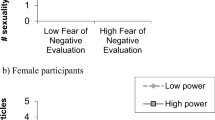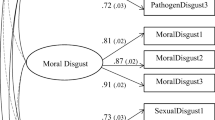Abstract
We examined whether, due to men’s desire to reject stereotypically feminine traits in themselves, a masculinity threat would elicit negative affect toward effeminate, but not masculine gay men. Fifty-three male undergraduates from the United States received bogus feedback that they had either a “masculine” or “feminine” personality before rating affect toward two “types” of gay men: effeminate and masculine. Results were consistent with the notion that defensive reactions target groups stereotyped as having the specific traits perceivers wish to deny in themselves: masculinity threat selectively increased negative affect toward effeminate, but not masculine, gay men. Thus, gay men who exhibit feminine traits may be at particular risk from men whose masculinity is threatened.
Similar content being viewed by others
References
Bem, S. L. (1974). The measurement of psychological androgyny. Journal of Consulting and Clinical Psychology, 42, 155–162.
Bosson, J. K., Prewitt-Freilino, J. L., & Taylor, J.N. (2005). Role rigidity: A problem of identity misclassification? Journal of Personality and Social Psychology, 89, 552–565.
Clausell, E., & Fiske, S. T. (2005). When do subgroup parts add up to the stereotype whole? Mixed stereotype content for gay male subgroups explains overall ratings. Social Cognition, 23, 161–181.
Connell, R. W. (1995). Masculinities. Berkeley, CA: University of California Press.
Cuddy, A. J. C., Fiske, S. T., & Glick, P. (2007). The BIAS Map: Behaviors from intergroup affect and stereotypes. Journal of Personality and Social Psychology (in press).
Dovidio, J. F., Brigham, J. C., Johnson, B. T., & Gaertner, S. L. (1996). Stereotyping, prejudice, and discrimination: Another look. In C. N. Macrae, C. Stangor, & M. Hewstone (Eds.), Stereotypes and stereotyping (pp. 276–319). New York: Guilford.
Davies, M. (2004). Correlates of negative attitudes toward gay men: Sexism, male role norms, and male sexuality. Journal of Sex Research, 41, 259–266.
Eagly, A. H. (1987). Sex differences in social behavior: A social role interpretation. Hillsdale, NJ: Erlbaum.
Govorun, O., Fuegen, K., & Payne, K. B. (2006). Stereotypes focus defensive projection. Personality and Social Psychology Bulletin, 32, 781–793.
Hebl, M., Foster, J. B., Mannix, L. M., & Dovidio, J. F. (2002). Formal and interpersonal discrimination: A field study of bias toward homosexual applications. Personality and Social Psychology Bulletin, 28, 815–825.
Herek, G. M. (1989). Hate crimes against lesbians and gay men: Issues for research and policy. American Psychologist, 44, 948–955.
Kilianski, S. E. (2003). Explaining heterosexual men’s attitudes toward women and gay men: The theory of exclusively masculine identity. Psychology of Men and Masculinity, 4, 37–56.
Kirk, R. E. (1990). Statistics: An introduction (3rd ed.). Fort Worth, TX: Holt, Rhinehart, and Winston.
Kite, M. E., & Whitely, B. E. (1996). Sex differences in attitudes towards homosexual persons, behavior and civil rights: A meta-analysis. Personality and Social Psychology Bulletin, 22, 336–353.
LaMar, L. & Kite, M. E. (1998). Sex differences in attitudes toward gay men and lesbians: A multidimensional perspective. Journal of Sex Research, 35, 189–196.
Laner, M. R., & Laner, R. H. (1979). Personal style or sexual preference: Why gay men are disliked. International Review of Modern Sociology, 9, 215–228.
Maass, A., Cadinu, M., Guarnieri, G., & Grasselli, A. (2003). Sexual harassment under social identity threat: The computer harassment paradigm. Journal of Personality and Social Psychology, 85, 853–870.
Mackie, D., Devos, T. & Smith, E. R. (2000). Intergroup emotions: Explaining offensive action tendencies in an intergroup context. Journal of Personality and Social Psychology, 79, 602–616.
Mahaffey, A. L., Bryan, A., & Hutchison, K. E. (2005). Using startle eye blink to measure the affective component of antigay bias. Basic and Applied Social Psychology, 27, 37–45.
Rudman, L. A., & Fairchild, K. (2004). Reactions to counterstereotypic behavior: The role of backlash in cultural stereotype maintenance. Journal of Personality and Social Psychology, 87, 157–176.
Schütz, H., & Six, B. (1996). How strong is the relationship between prejudice and discrimination? A meta-analytic answer. International Journal of Intercultural Relations, 20, 441–462.
Theodore, P. S., & Basow, S. A. (2000). Heterosexual masculinity and homophobia: A reaction to the self? Journal of Homosexuality, 40, 31–48.
Taywaditep, K. J. (2001). Marginalization among the marginalized: Gay men’s anti-effeminacy attitudes. Journal of Homosexuality, 42, 1–28.
Wilkinson, W. W. (2004). Authoritarian hegemony, dimensions of masculinity, and male antigay attitudes. Psychology of Men & Masculinity, 5, 121–131.
Willer, R. (2005). Overdoing gender: A test of the masculine overcompensation thesis. American Sociological Association Meetings. Philadelphia, PA, August.
Author information
Authors and Affiliations
Corresponding author
Rights and permissions
About this article
Cite this article
Glick, P., Gangl, C., Gibb, S. et al. Defensive Reactions to Masculinity Threat: More Negative Affect Toward Effeminate (but not Masculine) Gay Men. Sex Roles 57, 55–59 (2007). https://doi.org/10.1007/s11199-007-9195-3
Received:
Accepted:
Published:
Issue Date:
DOI: https://doi.org/10.1007/s11199-007-9195-3




